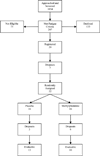Methylphenidate for fatigue in ambulatory men with prostate cancer
- PMID: 20665492
- PMCID: PMC3632439
- DOI: 10.1002/cncr.25424
Methylphenidate for fatigue in ambulatory men with prostate cancer
Abstract
Background: Fatigue is a highly prevalent and clinically significant symptom of advanced prostate cancer. To date, however, there are no published controlled trials of interventions for fatigue in men with prostate cancer.
Methods: This 6-week, randomized, double-blind, placebo-controlled design evaluated the efficacy of methylphenidate to treat fatigue in prostate cancer patients. Inclusion criteria included men with advanced prostate cancer and the presence of moderate to severe fatigue. Patients with major depression, hypothyroidism, uncontrolled hypertension, arrhythmia, or anemia were excluded. Fatigue levels, blood pressure, pulse, and other safety concerns were monitored regularly.
Results: Thirty-two subjects were randomized to methylphenidate (n=16) or placebo (n=16). Brief Fatigue Inventory total scores significantly decreased for both groups; however, the methylphenidate group, as compared with placebo, reported greater decrease on Brief Fatigue Inventory severity scores (P=.03) and a trend toward greater decrease on Brief Fatigue Inventory total scores (P=.07). A significantly greater number of subjects in the methylphenidate group versus the placebo group demonstrated clinically significant improvement in fatigue on total Brief Fatigue Inventory scores (7 of 10 vs 3 of 13) and Brief Fatigue Inventory severity scores (8 of 10 vs 3 of 13). Importantly, 6 subjects in the methylphenidate group discontinued because of increased blood pressure or tachycardia. There were no serious adverse events.
Conclusions: Methylphenidate is effective in treating fatigue in men with prostate cancer; however, oncologists need to monitor for possible pulse and blood pressure elevations.
Copyright © 2010 American Cancer Society.
Figures
Similar articles
-
A randomized, double-blind, placebo-controlled trial of psychostimulants for the treatment of fatigue in ambulatory patients with human immunodeficiency virus disease.Arch Intern Med. 2001 Feb 12;161(3):411-20. doi: 10.1001/archinte.161.3.411. Arch Intern Med. 2001. PMID: 11176767 Clinical Trial.
-
Phase II, randomised, double-blind, placebo-controlled trial of methylphenidate for reduction of fatigue levels in patients with prostate cancer receiving LHRH-agonist therapy.BJU Int. 2015 Nov;116(5):744-52. doi: 10.1111/bju.12755. Epub 2015 Jun 8. BJU Int. 2015. PMID: 24684534 Clinical Trial.
-
Methylphenidate Versus Placebo for Treating Fatigue in Patients With Advanced Cancer: Randomized, Double-Blind, Multicenter, Placebo-Controlled Trial.J Clin Oncol. 2024 Jul 10;42(20):2382-2392. doi: 10.1200/JCO.23.02639. Epub 2024 May 17. J Clin Oncol. 2024. PMID: 38757263 Free PMC article. Clinical Trial.
-
Immediate-release methylphenidate for attention deficit hyperactivity disorder (ADHD) in adults.Cochrane Database Syst Rev. 2021 Jan 18;1(1):CD013011. doi: 10.1002/14651858.CD013011.pub2. Cochrane Database Syst Rev. 2021. PMID: 33460048 Free PMC article.
-
The Use of Methylphenidate for Physical and Psychological Symptoms in Cancer Patients: A Review.Curr Drug Targets. 2018;19(8):877-887. doi: 10.2174/1389450118666170317162603. Curr Drug Targets. 2018. PMID: 28322161 Review.
Cited by
-
Cancer-related fatigue: epidemiology, pathogenesis, diagnosis, and treatment.Dtsch Arztebl Int. 2012 Mar;109(9):161-71; quiz 172. doi: 10.3238/arztebl.2012.0161. Epub 2012 Mar 2. Dtsch Arztebl Int. 2012. PMID: 22461866 Free PMC article.
-
Role of methylphenidate in the treatment of fatigue in advanced pancreatic cancer population.Ann Gastroenterol. 2016 Oct-Dec;29(4):536-543. doi: 10.20524/aog.2016.0065. Epub 2016 Jun 16. Ann Gastroenterol. 2016. PMID: 27708523 Free PMC article.
-
Use of Disease-Modifying Therapies in Pediatric MS.Curr Treat Options Neurol. 2016 Aug;18(8):36. doi: 10.1007/s11940-016-0420-7. Curr Treat Options Neurol. 2016. PMID: 27314428 Review.
-
A randomized, double-blind, 2-period, placebo-controlled crossover trial of a sustained-release methylphenidate in the treatment of fatigue in cancer patients.Cancer J. 2014 Jan-Feb;20(1):8-14. doi: 10.1097/PPO.0000000000000018. Cancer J. 2014. PMID: 24445757 Free PMC article. Clinical Trial.
-
Pharmacologic interventions for fatigue in cancer and transplantation: a meta-analysis.Curr Oncol. 2018 Apr;25(2):e152-e167. doi: 10.3747/co.25.3883. Epub 2018 Apr 30. Curr Oncol. 2018. PMID: 29719440 Free PMC article.
References
-
- Reddy S, Bruera E, Pace E, Zhang K, Reyes-Gibby CC. Clinically important improvement in the intensity of fatigue in patients with advanced cancer. J Palliat Med. 2007;10(5):1068–1075. - PubMed
-
- Forlenza M, Hall P, Lichtenstein P, Evengard B, Sullivan PF. Epidemiology of cancer-related fatigue in the Swedish twin registry. Cancer. 2005;104(9):2022–2031. - PubMed
-
- Ahlberg K, Ekman T, Gaston-Johansson F, Mock V. Assessment and management of cancer-related fatigue in adults. Lancet. 2003;362(9384):640–650. - PubMed
-
- Stone P, Richards M, A'Hern R, Hardy J. A study to investigate the prevalence, severity and correlates of fatigue among patients with cancer in comparison with a control group of volunteers without cancer. Ann Oncol. 2000;11(5):561–567. - PubMed
Publication types
MeSH terms
Substances
Grants and funding
LinkOut - more resources
Full Text Sources
Other Literature Sources
Medical




